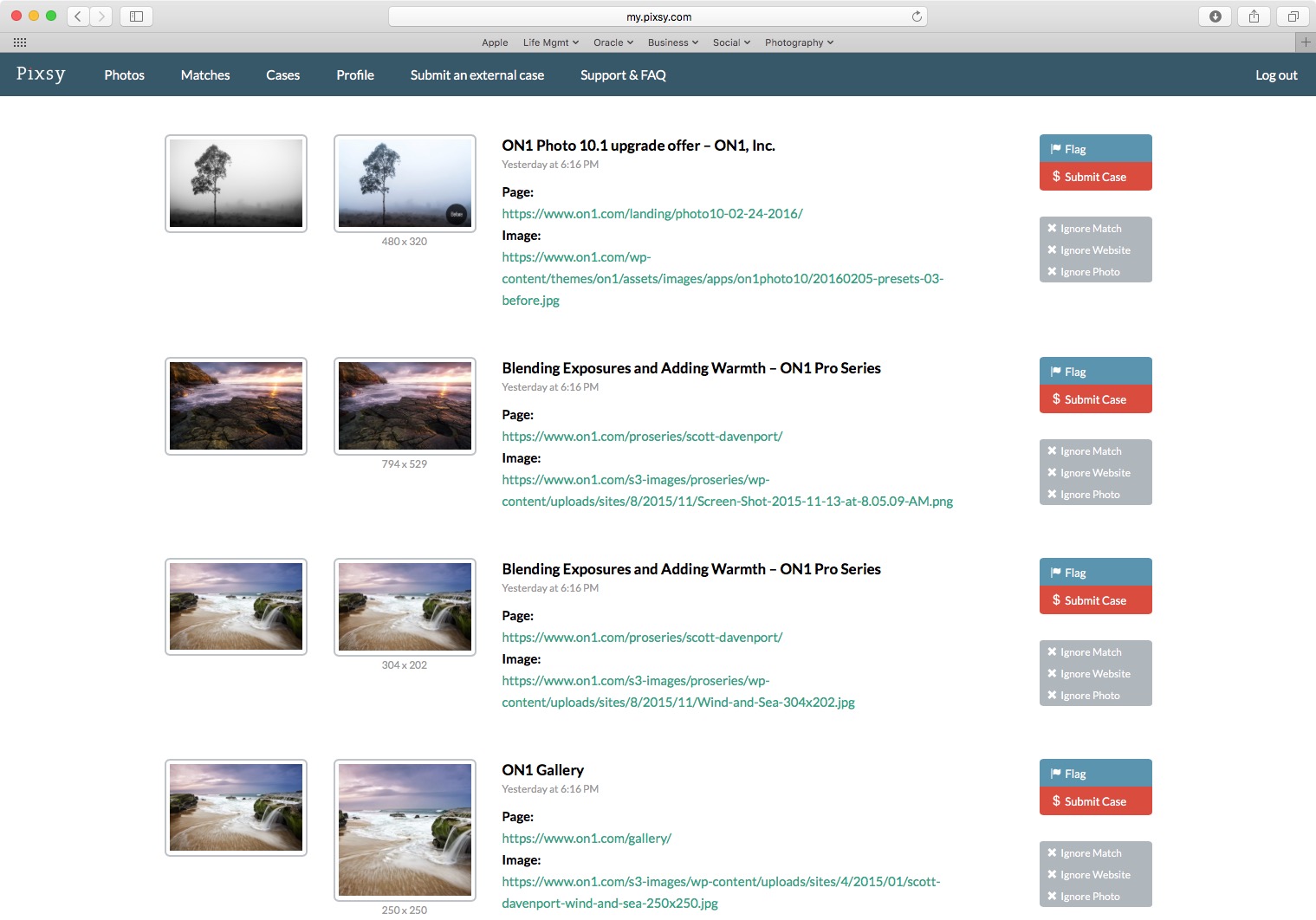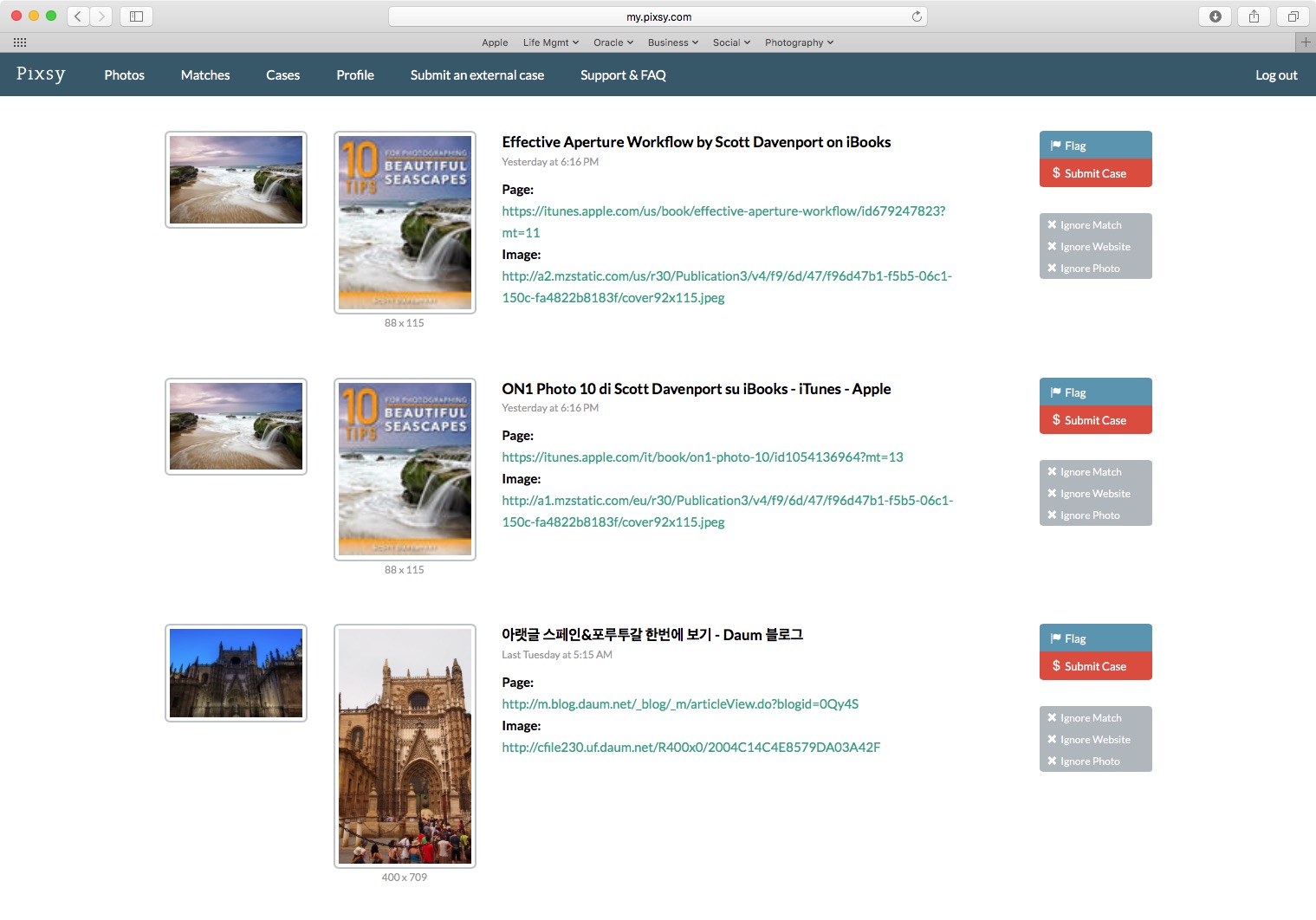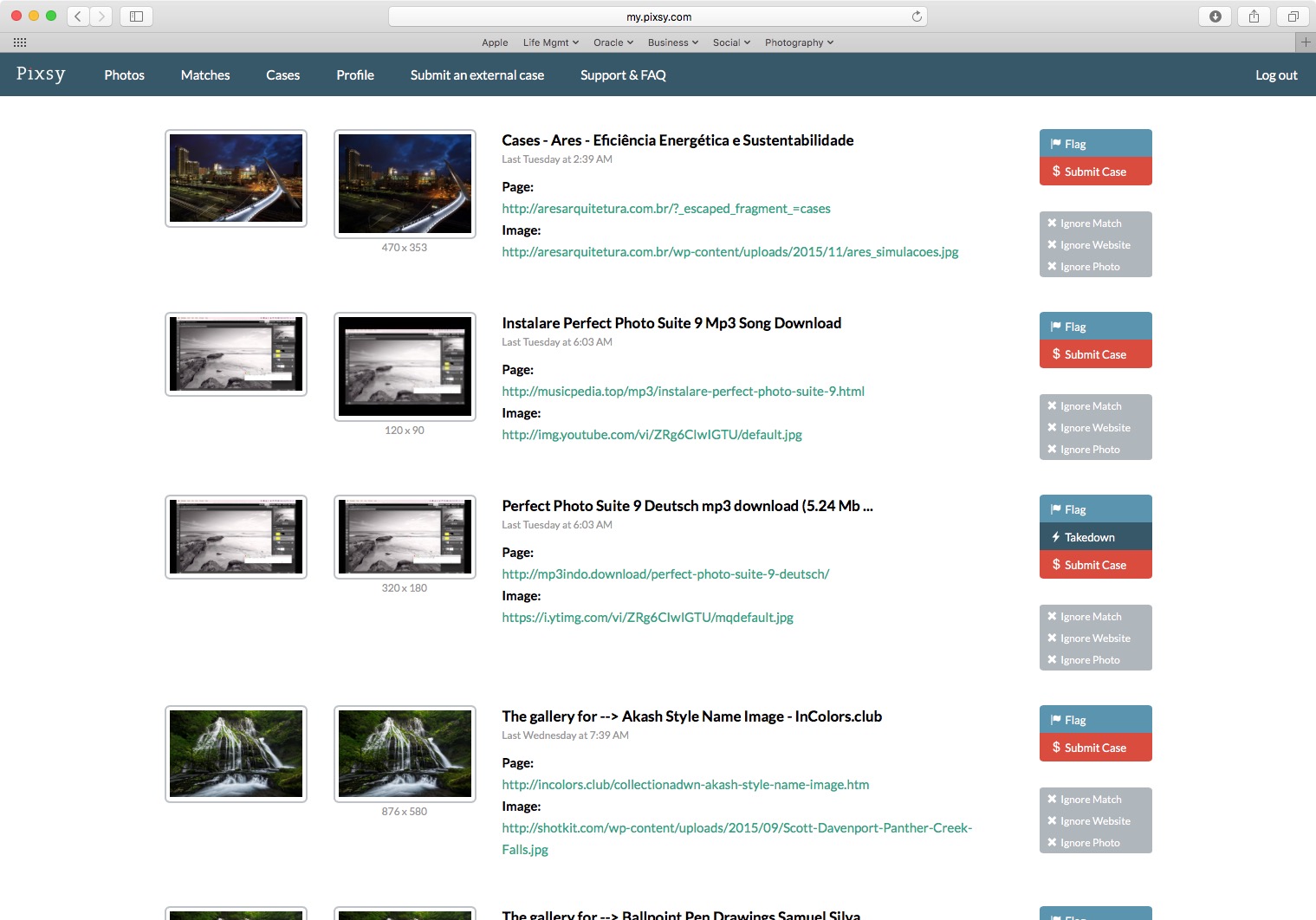Protect Your Photos With Pixsy
Disclaimer Stuff
Just so we're all on the same page here... I don't write reviews for products I don't like. If I like a product and use it, I tell you about it. If I see value in a product, I'll tell you about it. I don't accept payment from a company to write a review.Product links on the site may be affiliate links. If you like my site, see value in a product I've talked about or use, and click one of my links to purchase it, I'll make a dollar or two. That's it. Plain and simple. Now let's get to it.
What is Pixsy?
Pixsy is a service that helps you find how your photos are being used online. It automatically and continually scans the web for your photos, shows you the matches, and makes it easy to request royalties from those using your photos without proper licensing. A basic account is free.
I've been using Pixsy for 9 months or so. I started using the service to protect my photos, to find unlicensed usage of my imagery. I've since grown to enjoy other insights the reports give me, too.
A Very Brief Tour of Pixsy
The interface and usage is quite straightforward. After setting up a profile, you point Pixsy to your various online presences such as 500px, Flickr and SmugMug. You can include your own personal website, too. In a short time, Pixsy reports on potential matches to your imagery.
You can ignore a match, flag it to review later, or submit a case if you determine your photo is being used inappropriately. It helps if your photos are registered with your copyright office, too. Pixsy can seek additional money for you.
The matching engine is quite good... sometimes too good :-). You can see above Pixsy matched one of my photos to one of my book covers. I'll talk about dealing with false positives in just a bit.
Pros
There are two reasons I use Pixsy. First is the legal and licensing help Pixsy provides. When I find that someone has used my photo without proper licensing, I really like that I can quickly submit a claim through Pixsy and get their help to resolve an issue. I'm often surprised where my images end up, and (sadly) my photos are used without permission relatively often. It's a risk of sharing your work online. Pixsy helps me manage and mitigate that risk. They even help you with the pricing if you need that.
The other reason is the Pixsy machines are always scanning the web, looking for matches to my photos. Other image match services exist (like Google), but with Pixsy I don't have to run the searches myself. Pixsy also makes it easy to ignore matches. There may be some search-fu I can apply to help filter results, but I'd rather spend my time making more photographs than tailoring search queries.
Cons
Pixsy's reach for claims is limited. Pixsy handles claims in about 10 countries right now. Unfortunately, many of the abuses of my photos have occurred in countries not managed by Pixsy today. One of the photos in the screenshots above is a commercial company using one of my photos without a license. Unfortunately it's in a country not yet managed within Pixsy. But at least I know about it now. I have watched the number of countries grow over the last 9 months, and I'm hopeful Pixsy will continue to grow coverage.
And of course you have to put in the work to review your Pixsy matches, decide which matches are an inappropriate use and warrant filing a claim. I carve out an hour or so a week to check my Pixsy matches. Their interface helps, letting me sort matches by most commercial.
Another hurdle is dealing with false positives. This is a big one... but not a challenge unique to Pixsy.
False Positives
Any reverse image lookup system will generate false positives. I classify false positives into three types:
- Common Subjects: Photos of common locations, such as the Eiffel Tower, will generate a lot of matches. Most of the time such a match is a false positive. A very false positive of the Seville Cathedral is in the screen shots above.
- Shares & Aggregations: Someone retweets your photo, reshares on Instagram, or other social media references. Heck, even my own cross-posts sometimes get tagged in Pixsy. I'll sometimes check into these matches, mainly to ensure I am getting attribution as the photographer. In the vast majority of cases when I've reached out to the blog owner, they very quickly add attribution and link back to my site.
Another big source of false positives are image aggregators that build collections using photo keywords or embedded GPS locations. I happen to have a high degree of YouTube matches, especially for more popular videos that are on others' "liked" lists or is suggested by YouTube as a watch-this-next video.
- Legitimate Use: I put myself out there and most of my photos are under the Creative Commons, Non-Commercial No Derivatives license. So, personal bloggers, social media folks, etc. can use my images. When I check Pixsy matches, I need to dig a little deeper and gage how commercial the site using my photo is.
Another thought on legitimate use... If your sell your photos through stock agencies, a match may be legitimate use. If Pixsy finds a match to one of your stock photos, unless you get a report from your stock agency what clients licensed your image, it can be hard to tell if the match is something to pursue as unlicensed use
It takes time to sift through matches. I mentioned the Pixsy interface lets you sort matches and examine the "most commercial" first. That's what I focus my attention on.
Insights
A benefit of Pixsy I discovered over time is insights into how my photos are seen by others. It is interesting to see what "the market" likes, and how bloggers associate their content with certain visuals. For example, I have a photo of a soft sunrise in the desert. A yoga blogger (correctly) used that photo in one of her posts. In hindsight, I see the connections now. A scene of calmness, the beginning of a new day – more than a landscape or travel photo.
Travel, skyline and food photos are popular. Lighthouses are popular. I don't take many photos of food. Although, a quick snap of some Belgian chocolates I took while on vacation a few years ago is used quite often on personal food blogs. In a more macabre example, one of my photos of the Coronado Bridge graced an article of the most popular suicide bridges. Not at all what I'd envisioned when I made the photo.
Generally speaking, I have been surprised how wide spread my photos are on the internet.
It's Worth It
All in all, Pixsy is a service worth using. You'll get immediate insights on how your photos are being used online. And if you find unlicensed usage, Pixsy is there to help.



